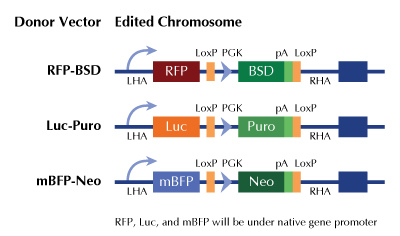VLDL Receptor (VLDLR) Human Gene Knockout Kit (CRISPR)
CAT#: KN211796LP
VLDLR - human gene knockout kit via CRISPR, HDR mediated
Functional Cassette: GFP-puro RFP-BSD mBFP-Neo
HDR-mediated knockout kit validation
USD 1,657.00
4 Weeks*
Specifications
| Product Data | |
| Format | 2 gRNA vectors, 1 Luciferase-Puro donor, 1 scramble control |
| Donor DNA | Luciferase-Puro |
| Symbol | VLDL Receptor |
| Locus ID | 7436 |
| Components |
KN211796G1, VLDL Receptor gRNA vector 1 in pCas-Guide CRISPR vector KN211796G2, VLDL Receptor gRNA vector 2 in pCas-Guide CRISPR vector KN211796LPD, donor DNA containing left and right homologous arms and Luciferase-Puro functional cassette. GE100003, scramble sequence in pCas-Guide vector |
| Disclaimer | These products are manufactured and supplied by OriGene under license from ERS. The kit is designed based on the best knowledge of CRISPR technology. The system has been functionally validated for knocking-in the cassette downstream the native promoter. The efficiency of the knock-out varies due to the nature of the biology and the complexity of the experimental process. |
| Reference Data | |
| RefSeq | NM_001018056, NM_003383, NM_001322225, NM_001322226 |
| UniProt ID | P98155 |
| Synonyms | CAMRQ1; CARMQ1; CHRMQ1; VLDLRCH |
| Summary | The low density lipoprotein receptor (LDLR) gene family consists of cell surface proteins involved in receptor-mediated endocytosis of specific ligands. This gene encodes a lipoprotein receptor that is a member of the LDLR family and plays important roles in VLDL-triglyceride metabolism and the reelin signaling pathway. Mutations in this gene cause VLDLR-associated cerebellar hypoplasia. Alternative splicing generates multiple transcript variants encoding distinct isoforms for this gene. [provided by RefSeq, Aug 2009] |
Documents
| Product Manuals |
| FAQs |
| SDS |
Resources
Other Versions
| SKU | Description | Size | Price |
|---|---|---|---|
| KN211796 | VLDLR - human gene knockout kit via CRISPR, HDR mediated |
USD 1,657.00 |
|
| KN211796BN | VLDLR - human gene knockout kit via CRISPR, HDR mediated |
USD 1,657.00 |
|
| KN211796RB | VLDLR - human gene knockout kit via CRISPR, HDR mediated |
USD 1,657.00 |
|
| KN411796 | VLDLR - KN2.0, Human gene knockout kit via CRISPR, non-homology mediated. |
USD 1,657.00 |
|
| GA105126 | VLDLR CRISPRa kit - CRISPR gene activation of human very low density lipoprotein receptor |
USD 1,657.00 |
{0} Product Review(s)
Be the first one to submit a review






























































































































































































































































 Germany
Germany
 Japan
Japan
 United Kingdom
United Kingdom
 China
China
